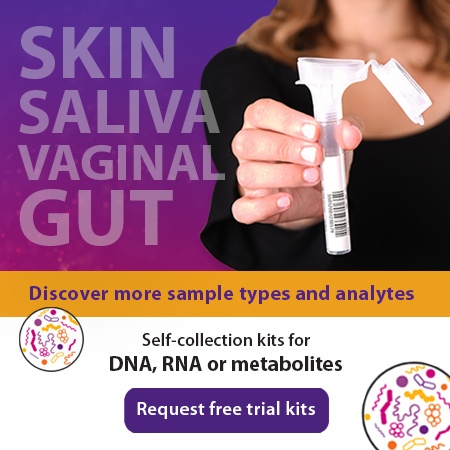2020-12-03
2020 is an incredibly unique year regarding conferences and events. Due to restrictions and social distancing, conferences this year have all gone virtual – most for the very first time. Despite the circumstances of the pandemic, this year’s World of Microbiome 2020 event sessions were rather successful. In October, the World of Microbiome 2020 consisted of two tracks, the 2nd edition of the successful Pregnancy, Birth & Infancy, and the brand-new track Digestive & Metabolic Health.
Our team at DNA Genotek attended the conference this year and in case you missed it, we wanted to highlight the biggest trends, exciting new research, and hot topics from The World of Microbiome 2020.
Pregnancy, Birth, & Infancy
Throughout the years, microbiome research in the field of pregnancy and infancy have become an important focus in maternity and new-born health care. Incredible research was presented on mother and infant fecal microbiomes, vaginal microbiome in prenatal and postnatal periods, and the evolution of gut microbial development during early life. Below are some examples of the work presented at this year’s event.
- “Vaginal microbiota in the prenatal and postnatal periods” presented by Dr. Alevtina Savcheva (St. Petersburg State Pediatric Medical University). The study described the vaginal microbiota in the prenatal and postnatal periods depending on the mode of delivery. They found that normal vaginal microbiota is restored quickly in women after vaginal delivery (by the 4th-5th days of postnatal period) compared to women after Caesarian section (C-section). They also found that antibacterial treatment after a C-section affects vaginal biocenosis (community of organisms within the vagina) in the postnatal period and leads to a longer recovery time for the mother.
- “Impact of medication, nutrition, and probiotics in the first three weeks of life: comparison of preterm infants’ gut microbiomes in three neonatal intensive care units.” presented by Dr. Christine Moissl-Eichinger (Medical University of Graz). According to Dr. Moissl-Eichinger and her team, the first 3 weeks of life are incredibly important for the development of the infant’s microbiome. Pre-term born infants spent their first days in the restricted environment setting of the neonatal intensive care unit, an important contributing factor in the development of the infant’s microbiome.
- “Can probiotics help to early colonize the preterm babies’ gastrointestinal tract with healthy microbiota?” presented by Dr. Esther Jimenez (University of Madrid). Jimenez presented how many factors can alter the process of preterm infant’s gut colonization, and how probiotic supplementation significantly reduces morbidity and mortality rates. They investigated the effect of a new probiotic combination of strains isolated from human milk on the infant’s gastrointestinal tract colonization and their immune response. They concluded that probiotic supplementation during neonatal unit stays help form a healthier gastrointestinal colonization of preterm infants.
At the conference, our team also noticed some new trending terms thrown around from different talks and discussions. At the Pregnancy, Birth & Infancy event, the concept of “Vaginal Microbiome Transplant” (VMT) was heard. Most of those in the microbiome profession are rather familiar with Fecal Microbiome Transplants (FMT), however, the concept of VMT is rather new. With FMTs becoming one of the most successful first-line treatments for Clostridium difficile and other gastro-intestinal infections, VMT is currently being researched to see if it can do the same but with vaginal infections1.
[Are you studying the vaginal microbiome? Learn more about our vaginal microbiome collection and stabilization solution OMNIgene®•VAGINAL]
Digestive & metabolic health
This year the World of Microbiome held their first event for digestive and metabolic health. The field of gut microbiome has accelerated throughout the years, spawning incredible amounts of research, numerous companies, and expanding technologies. Below are a few highlights of popular topics, research studies, and discussions presented during this session.
Fecal Microbiome Transplants
One of the most popular topics at this conference was surrounding Fecal Microbiome Transplants. There even sparked a debate event where Dr. Josbert Keller from the Haaglanden Medical Center and Dr. Alisa Hart from St. Mark’s Academic Institute went head-to-head about whether FMT is the best treatment for IBD – which yielded more questions than answers, demonstrating how the field of FMT is still in its infancy despite the significant progress of recent fecal microbiome research.
Microbiome and mental health
The event also featured research based on the influence of the gut microbiota and mental health. For example, “The Intestinal Microbiota and Metabolites in Anorexia Nervosa Patients” presented by Dr. Radka Roubalova from the Czech Academy of Sciences, highlighted the discovery of specific bacterial groups that could be involved in the development of Anorexia Nervosa (AN).
Postbiotics
Much like the VMT example given above in the Pregnancy, birth, and infancy event, postbiotics was a newly trending topic that started to emerge within sessions and discussions. In recent microbiome research, probiotics and prebiotics became well known research topics now postbiotics is starting to join those conversations. Postbiotics comprise of metabolites and/or cell-wall components released by probiotics (live bacteria)2.
“These postbiotics have drawn attention because of their clear chemical structure, safety dose parameters, long shelf life and the content of various signaling molecules which may have anti-inflammatory, immunomodulatory, anti-obesogenic, antihypertensive, hypocholesterolemic, anti-proliferative, and antioxidant activities. These properties suggest that postbiotics may contribute, to the improvement of host health by improving specific physiological functions, even though the exact mechanisms have not been entirely elucidated.” [1]
Microbiome and Nutrition
An incredible number of posters focused on this popular topic that has lately been dominating the gut microbiome field. The connection and importance of the gut microbiome and nutrition has yielded a great number of discoveries, solutions, and even more questions as scientists continue to dig through this research topic. Some research presented the combination of the microbiome and metabolome when looking towards nutrition in humans.
One example was “Microbiome/metabolome signature and metabolic health in lean vegans, lean omnivores, obese and prediabetics,” presented by Dr. Monika Cahova from the Institute for Clinical and Experimental Medicine. Their team explored the differences in metabolic health and intestinal microbiome/metabolome signature related to fiber intake in cohorts differing in food composition. They found significant differences in the composition of intestinal microbiome and intestinal and serum metabolome that corresponded with the metabolic health of healthy vegans, healthy lean omnivores, healthy obese omnivores, and obese omnivores with drug naïve pre/diabetes.
[If you are studying gut microbiome and metabolome research, you can learn more about our gut microbiome and gut metabolome collection kits OMNIgene•GUT and OMNImet•GUT.]
Tell us what research topics and discussions you enjoyed at World of Microbiome.
If you are interested to learn more about the gut microbiome, vaginal microbiome and gut metabolome, you can send us an email at info@dnagenotek.com or visit our website www.dnagenotek.com for more information. You can also click the banner below to request free samples of our microbiome and metabolome collection kits.
References:
[1] https://www.sciencedirect.com/science/article/abs/pii/S0924224417302765


